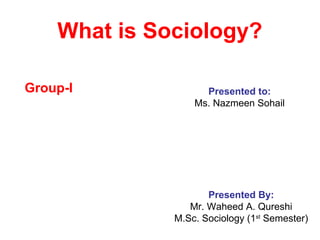
What is sociology
- 1. What is Sociology? Group-I Presented to: Ms. Nazmeen Sohail Presented By: Mr. Waheed A. Qureshi M.Sc. Sociology (1st Semester)
- 2. “Sociology may be defined “Sociology is the as the study of society – the Auguste objective study of human web of human interactions Comte first behaviour in so far it is and relationships” Ginsberg used the word affected by the fact (“The study of Society”, Sociology in people live in groups”: 1939) Sugarman (Sociology”, 1836 1968) “The purpose of Sociology is the scientific study of human What is Sociology ? society through the investigation of people’s social behaviour”: Giner “Sociology is the study of “Sociology”, 1972 individuals in a social setting…. Sociologists study the interrelationships between individuals, organizations, “Sociology is the study of human cultures and societies”: social life, groups and societies. It is Ritzer (“Sociology”, a dazzling and compelling enterprise, 1979) having as its subject matter our own behaviour as social beings. The scope of sociology is extremely wide, “Sociology is the study of individuals in groups ranging from the analysis of passing in a systematic way, which grew out of the encounters between individuals in the research for understanding associated with the street up to the investigation of world- industrial and scientific revolutions of the 18 th wide social processes”: Giddens and 19th centuries”: Lawson and Garrod (“The (Sociology”, 1989) Complete A-Z Sociology Handbook”, 1996)
- 3. Two Major Themes Identify some of the things Identify some of the ways sociologists study sociologists study social life Sociologists study social The definitions included words like behaviour – people and their “scientific”, “systematic” and patterns of behaviour. The focus “objective” – ideas that tell us is on the way people form about how sociologists study relationships and how these behaviour and the kinds of relationships, considered in their knowledge they are trying to totality, are represented by the produce to explain such behaviour. concept of a “society” The focus of attention is group Sociologists create knowledge that behaviour – how the groups is factual, rather than simply based people join or are born into (family, on opinion. Systematic ways of work, education and so forth) affect studying social behaviour are used their development and behaviour. – sociologists test their ideas about social behaviour using evidence drawn from their observations
- 4. “Sociology is a social science concerned with the study of social relationships and the various ways these relationships are patterned in terms of our membership of social groups”. This being the case, we need to look a little more closely at the concepts of social groups in order to understand how the relationships we form shape our behaviour…….
- 5. A Friendship Group A Work Group includes people who Might include people hang around together who do the same because they like type of job. each other. A Family Group A Peer Group An Educational Group People who are Includes people Might includes people related by birth, of roughly the studying together in marriage, etc. same age the same University or class. A “social group” is a collection of individuals who interact – both formally and informally – with each other.
- 6. The largest group Structure to which we Society usually belong. Our relationships are based on (or Institutions structured by) both formal and informal rules. “Society” Small Groups therefore, represents a totality of relationships that Action Individuals imposes rules upon our behaviour. Groups, such as families, peer and friendship groups, etc. Institutions are stable patterns of group behaviour that persist The main types of institutional groups in our society are: over long periods of Family and Kinship, Government, Work and Cultural time. Institutions such as the Media, Education and Religion
- 7. One of the main things That is, the way our individual lives are built sociologists investigate are around social relationships and the rules we “Social Structure” have developed to govern such relationships. In the following screens, therefore, we need to investigate some of the ways our behaviour is constrained, formally and informally, by social structures… Sociologists argue that our individual choices of behaviour are shaped by the relationships we form (or have imposed on us).
- 8. Some of the Ways–Influence Our Behaviour: Society The Media • Language • Lifestyle • Laws • Advertising School Our Family • Respect for Authority • Right and Wrong Behaviour • Learning • Language Our Peers Our Friends • Fashion • Self-perception • Gender Behaviour
- 9. If Sociology is the study of social relationships and the way in which our lives are structured by rules, it follows that the initial answer to the question “What is Sociology?” is that it is the study of Social Order…. In other words, Sociology explains how order is: A "social order" is a relatively persistent system of Created institutions, patterns of interactions and customs, capable of continually reproducing at least those conditions essential for its own existence. The Maintained concept refers to all those facts of society which remain relatively constant over time. These Reproduced conditions could include both property, exchange and power relations, but also cultural forms, communication relations and ideological systems of values.